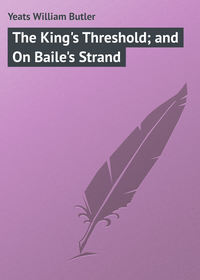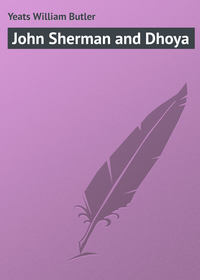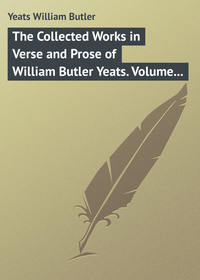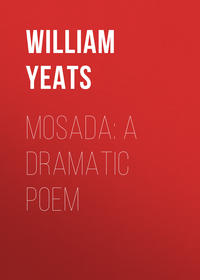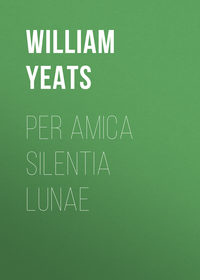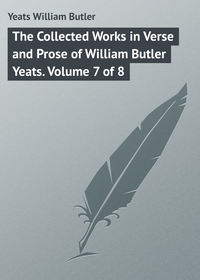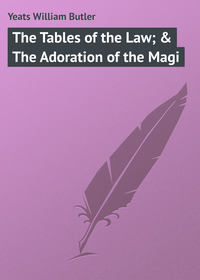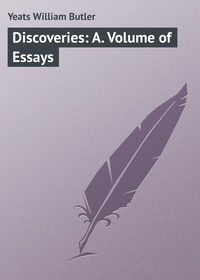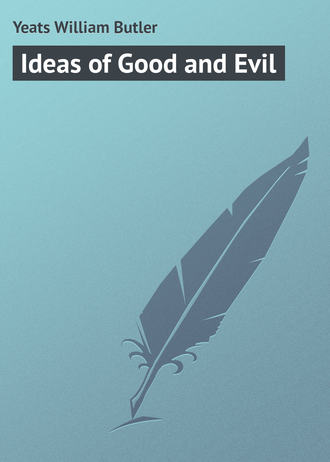 полная версия
полная версияIdeas of Good and Evil

William Butler Yeats
Ideas of Good and Evil
WHAT IS ‘POPULAR POETRY’?
I think it was a Young Ireland Society that set my mind running on ‘popular poetry.’ We used to discuss everything that was known to us about Ireland, and especially Irish literature and Irish history. We had no Gaelic, but paid great honour to the Irish poets who wrote in English, and quoted them in our speeches. I could have told you at that time the dates of the birth and death, and quoted the chief poems, of men whose names you have not heard, and perhaps of some whose names I have forgotten. I knew in my heart that the most of them wrote badly, and yet such romance clung about them, such a desire for Irish poetry was in all our minds, that I kept on saying, not only to others but to myself, that most of them wrote well, or all but well. I had read Shelley and Spenser and had tried to mix their styles together in a pastoral play which I have not come to dislike much, and yet I do not think Shelley or Spenser ever moved me as did these poets. I thought one day – I can remember the very day when I thought it – ‘If somebody could make a style which would not be an English style and yet would be musical and full of colour, many others would catch fire from him, and we would have a really great school of ballad poetry in Ireland. If these poets, who have never ceased to fill the newspapers and the ballad-books with their verses, had a good tradition they would write beautifully and move everybody as they move me.’ Then a little later on I thought, ‘If they had something else to write about besides political opinions, if more of them would write about the beliefs of the people like Allingham, or about old legends like Ferguson, they would find it easier to get a style.’ Then, with a deliberateness that still surprises me, for in my heart of hearts I have never been quite certain that one should be more than an artist, that even patriotism is more than an impure desire in an artist, I set to work to find a style and things to write about that the ballad writers might be the better.
They are no better, I think, and my desire to make them so was, it may be, one of the illusions Nature holds before one, because she knows that the gifts she has to give are not worth troubling about. It is for her sake that we must stir ourselves, but we would not trouble to get out of bed in the morning, or to leave our chairs once we are in them, if she had not her conjuring bag. She wanted a few verses from me, and because it would not have seemed worth while taking so much trouble to see my books lie on a few drawing-room tables, she filled my head with thoughts of making a whole literature, and plucked me out of the Dublin art schools where I should have stayed drawing from the round, and sent me into a library to read bad translations from the Irish, and at last down into Connaught to sit by turf fires. I wanted to write ‘popular poetry’ like those Irish poets, for I believed that all good literatures were popular, and even cherished the fancy that the Adelphi melodrama, which I had never seen, might be good literature, and I hated what I called the coteries. I thought that one must write without care, for that was of the coteries, but with a gusty energy that would put all straight if it came out of the right heart. I had a conviction, which indeed I have still, that one’s verses should hold, as in a mirror, the colours of one’s own climate and scenery in their right proportion; and, when I found my verses too full of the reds and yellows Shelley gathered in Italy, I thought for two days of setting things right, not as I should now by making my rhythms faint and nervous and filling my images with a certain coldness, a certain wintry wildness, but by eating little and sleeping upon a board. I felt indignant with Matthew Arnold because he complained that somebody, who had translated Homer into a ballad measure, had tried to write epic to the tune of Yankee Doodle. It seemed to me that it did not matter what tune one wrote to, so long as that gusty energy came often enough and strongly enough. And I delighted in Victor Hugo’s book upon Shakespeare, because he abused critics and coteries and thought that Shakespeare wrote without care or premeditation and to please everybody. I would indeed have had every illusion had I believed in that straightforward logic, as of newspaper articles, which so tickles the ears of the shopkeepers; but I always knew that the line of Nature is crooked, that, though we dig the canal beds as straight as we can, the rivers run hither and thither in their wildness.
From that day to this I have been busy among the verses and stories that the people make for themselves, but I had been busy a very little while before I knew that what we call popular poetry never came from the people at all. Longfellow, and Campbell, and Mrs. Hemans, and Macaulay in his Lays, and Scott in his longer poems are the poets of the middle class, of people who have unlearned the unwritten tradition which binds the unlettered, so long as they are masters of themselves, to the beginning of time and to the foundation of the world, and who have not learned the written tradition which has been established upon the unwritten. I became certain that Burns, whose greatness has been used to justify the littleness of others, was in part a poet of the middle class, because though the farmers he sprang from and lived among had been able to create a little tradition of their own, less a tradition of ideas than of speech, they had been divided by religious and political changes from the images and emotions which had once carried their memories backward thousands of years. Despite his expressive speech which sets him above all other popular poets, he has the triviality of emotion, the poverty of ideas, the imperfect sense of beauty of a poetry whose most typical expression is in Longfellow. Longfellow has his popularity, in the main, because he tells his story or his idea so that one needs nothing but his verses to understand it. No words of his borrow their beauty from those that used them before, and one can get all that there is in story and idea without seeing them, as if moving before a half-faded curtain embroidered with kings and queens, their loves and battles and their days out hunting, or else with holy letters and images of so great antiquity that nobody can tell the god or goddess they would commend to an unfading memory. Poetry that is not popular poetry presupposes, indeed, more than it says, though we, who cannot know what it is to be disinherited, only understand how much more, when we read it in its most typical expressions, in the Epipsychidion of Shelley, or in Spenser’s description of the gardens of Adonis, or when we meet the misunderstandings of others. Go down into the street and read to your baker or your candlestick-maker any poem which is not popular poetry. I have heard a baker, who was clever enough with his oven, deny that Tennyson could have known what he was writing when he wrote ‘Warming his five wits, the white owl in the belfry sits,’ and once when I read out Omar Khayyam to one of the best of candlestick-makers, he said, ‘What is the meaning of “we come like water and like wind we go”?’ Or go down into the street with some thought whose bare meaning must be plain to everybody; take with you Ben Jonson’s ‘Beauty like sorrow dwelleth everywhere,’ and find out how utterly its enchantment depends on an association of beauty with sorrow which written tradition has from the unwritten, which had it in its turn from ancient religion; or take with you these lines in whose bare meaning also there is nothing to stumble over, and find out what men lose who are not in love with Helen.
‘Brightness falls from the air,Queens have died young and fair,Dust hath closed Helen’s eye.’I pick my examples at random, for I am writing where I have no books to turn the pages of, but one need not go east of the sun or west of the moon in so simple a matter.
On the other hand, when Walt Whitman writes in seeming defiance of tradition, he needs tradition for his protection, for the butcher and the baker and the candlestick-maker grow merry over him when they meet his work by chance. Nature, which cannot endure emptiness, has made them gather conventions which cannot disguise their low birth though they copy, as from far off, the dress and manners of the well-bred and the well-born. The gatherers mock all expression that is wholly unlike their own, just as little boys in the street mock at strangely-dressed people and at old men who talk to themselves.
There is only one kind of good poetry, for the poetry of the coteries, which presupposes the written tradition, does not differ in kind from the true poetry of the people, which presupposes the unwritten tradition. Both are alike strange and obscure, and unreal to all who have not understanding, and both, instead of that manifest logic, that clear rhetoric of the ‘popular poetry,’ glimmer with thoughts and images whose ‘ancestors were stout and wise,’ ‘anigh to Paradise’ ‘ere yet men knew the gift of corn.’ It may be that we know as little of their descent as men knew of ‘the man born to be a king’ when they found him in that cradle marked with the red lion crest, and yet we know somewhere in the heart that they have been sung in temples, in ladies’ chambers, and our nerves quiver with a recognition they were shaped to by a thousand emotions. If men did not remember or half remember impossible things, and, it may be, if the worship of sun and moon had not left a faint reverence behind it, what Aran fisher-girl would sing —
‘It is late last night the dog was speaking of you; the snipe was speaking of you in her deep marsh. It is you are the lonely bird throughout the woods; and that you may be without a mate until you find me.
‘You promised me and you said a lie to me, that you would be before me where the sheep are flocked. I gave a whistle and three hundred cries to you; and I found nothing there but a bleating lamb.
‘You promised me a thing that was hard for you, a ship of gold under a silver mast; twelve towns and a market in all of them, and a fine white court by the side of the sea.
‘You promised me a thing that is not possible; that you would give me gloves of the skin of a fish; that you would give me shoes of the skin of a bird, and a suit of the dearest silk in Ireland.
‘My mother said to me not to be talking with you, to-day or to-morrow or on Sunday. It was a bad time she took for telling me that, it was shutting the door after the house was robbed…
‘You have taken the east from me, you have taken the west from me, you have taken what is before me and what is behind me; you have taken the moon, you have taken the sun from me, and my fear is great you have taken God from me.’
The Gael of the Scottish islands could not sing his beautiful song over a bride, had he not a memory of the belief that Christ was the only man who measured six feet and not a little more or less, and was perfectly shaped in all other ways, and if he did not remember old symbolical observances —
I bathe thy palmsIn showers of wine,In the cleansing fire,In the juice of raspberries,In the milk of honey.·····Thou art the joy of all joyous things,Thou art the light of the beam of the sun,Thou art the door of the chief of hospitality,Thou art the surpassing pilot star,Thou art the step of the deer of the hill,Thou art the step of the horse of the plain,Thou art the grace of the sun rising,Thou art the loveliness of all lovely desires.The lovely likeness of the LordIs in thy pure face,The loveliest likeness that was upon earth.I soon learned to cast away one other illusion of ‘popular poetry.’ I learned from the people themselves, before I learned it from any book, that they cannot separate the idea of an art or a craft from the idea of a cult with ancient technicalities and mysteries. They can hardly separate mere learning from witchcraft, and are fond of words and verses that keep half their secret to themselves. Indeed, it is certain that before the counting-house had created a new class and a new art without breeding and without ancestry, and set this art and this class between the hut and the castle, and between the hut and the cloister, the art of the people was as closely mingled with the art of the coteries as was the speech of the people that delighted in rhythmical animation, in idiom, in images, in words full of far-off suggestion, with the unchanging speech of the poets.
Now I see a new generation in Ireland which discusses Irish literature and history in Young Ireland societies, and societies with newer names, and there are far more than when I was a boy who would make verses for the people. They have the help, too, of a vigorous journalism, and this journalism sometimes urges them to desire the direct logic, the clear rhetoric, of ‘popular poetry.’ It sees that Ireland has no cultivated minority, and it does not see, though it would cast out all English things, that its literary ideal belongs more to England than to other countries. I have hope that the new writers will not fall into its illusion, for they write in Irish, and for a people the counting-house has not made forgetful. Among the seven or eight hundred thousand who have had Irish from the cradle, there is, perhaps, nobody who has not enough of the unwritten tradition to know good verses from bad ones, if he have enough mother-wit. Among all that speak English in Australia, in America, in Great Britain, are there many more than the ten thousand the prophet saw, who have enough of the written tradition education has set in room of the unwritten to know good verses from bad ones, even though their mother-wit has made them Ministers of the Crown or what you will? Nor can things be better till that ten thousand have gone hither and thither to preach their faith that ‘the imagination is the man himself,’ and that the world as imagination sees it is the durable world, and have won men as did the disciples of Him who —
His seventy disciples sentAgainst religion and government.1901.SPEAKING TO THE PSALTERY
I
I have always known that there was something I disliked about singing, and I naturally dislike print and paper, but now at last I understand why, for I have found something better. I have just heard a poem spoken with so delicate a sense of its rhythm, with so perfect a respect for its meaning, that if I were a wise man and could persuade a few people to learn the art I would never open a book of verses again. A friend, who was here a few minutes ago, has sat with a beautiful stringed instrument upon her knee, her fingers passing over the strings, and has spoken to me some verses from Shelley’s Skylark and Sir Ector’s lamentation over the dead Launcelot out of the Morte d’Arthur and some of my own poems. Wherever the rhythm was most delicate, wherever the emotion was most ecstatic, her art was the most beautiful, and yet, although she sometimes spoke to a little tune, it was never singing, as we sing to-day, never anything but speech. A singing note, a word chanted as they chant in churches, would have spoiled everything; nor was it reciting, for she spoke to a notation as definite as that of song, using the instrument, which murmured sweetly and faintly, under the spoken sounds, to give her the changing notes. Another speaker could have repeated all her effects, except those which came from her own beautiful voice that would have given her fame if the only art that gives the speaking voice its perfect opportunity were as well known among us as it was known in the ancient world.
II
Since I was a boy I have always longed to hear poems spoken to a harp, as I imagined Homer to have spoken his, for it is not natural to enjoy an art only when one is by oneself. Whenever one finds a fine verse one wants to read it to somebody, and it would be much less trouble and much pleasanter if we could all listen, friend by friend, lover by beloved. Images used to rise up before me, as I am sure they have arisen before nearly everybody else who cares for poetry, of wild-eyed men speaking harmoniously to murmuring wires while audiences in many-coloured robes listened, hushed and excited. Whenever I spoke of my desire to anybody they said I should write for music, but when I heard anything sung I did not hear the words, or if I did their natural pronunciation was altered and their natural music was altered, or it was drowned in another music which I did not understand. What was the good of writing a love-song if the singer pronounced love, ‘lo-o-o-o-o-ve,’ or even if he said ‘love,’ but did not give it its exact place and weight in the rhythm? Like every other poet, I spoke verses in a kind of chant when I was making them, and sometimes, when I was alone on a country road, I would speak them in a loud chanting voice, and feel that if I dared I would speak them in that way to other people. One day I was walking through a Dublin street with the Visionary I have written about in The Celtic Twilight, and he began speaking his verses out aloud with the confidence of those who have the inner light. He did not mind that people stopped and looked after him even on the far side of the road, but went on through poem after poem. Like myself, he knew nothing of music, but was certain that he had written them to a manner of music, and he had once asked somebody who played on a wind instrument of some kind, and then a violinist, to write out the music and play it. The violinist had played it, or something like it, but had not written it down; but the man with the wind instrument said it could not be played because it contained quarter-tones and would be out of tune. We were not at all convinced by this, and one day, when we were staying with a Galway friend who is a learned musician, I asked him to listen to our verses, and to the way we spoke them. The Visionary found to his surprise that he did not make every poem to a different tune, and to the surprise of the musician that he did make them all to two quite definite tunes, which are, it seems, like very simple Arabic music. It was, perhaps, to some such music, I thought, that Blake sang his Songs of Innocence in Mrs. Williams’ drawing-room, and perhaps he, too, spoke rather than sang. I, on the other hand, did not often compose to a tune, though I sometimes did, yet always to notes that could be written down and played on my friend’s organ, or turned into something like a Gregorian hymn if one sang them in the ordinary way. I varied more than the Visionary, who never forgot his two tunes, one for long and one for short lines, and could not always speak a poem in the same way, but always felt that certain ways were right, and that I would know one of them if I remembered the way I first spoke the poem. When I got to London I gave the notation, as it had been played on the organ, to the friend who has just gone out, and she spoke it to me, giving my words a new quality by the beauty of her voice.
III
Then we began to wander through the wood of error; we tried speaking through music in the ordinary way under I know not whose evil influence, until we got to hate the two competing tunes and rhythms that were so often at discord with one another, the tune and rhythm of the verse and the tune and rhythm of the music. Then we tried, persuaded by somebody who thought quarter-tones and less intervals the especial mark of speech as distinct from singing, to write out what we did in wavy lines. On finding something like these lines in Tibetan music, we became so confident that we covered a large piece of pasteboard, which now blows up my fire in the morning, with a notation in wavy lines as a demonstration for a lecture; but at last Mr. Dolmetsch put us back to our first thought. He made us a beautiful instrument half psaltery half lyre which contains, I understand, all the chromatic intervals within the range of the speaking voice; and he taught us to regulate our speech by the ordinary musical notes.
Some of the notations he taught us – those in which there is no lilt, no recurring pattern of sounds – are like this notation for a song out of the first Act of The Countess Cathleen.
It is written in the old C clef, which is, I am told, the most reasonable way to write it, for it would be below the stave on the treble clef or above it on the bass clef. The central line of the stave corresponds to the middle C of the piano; the first note of the poem is therefore D. The marks of long and short over the syllables are not marks of scansion, but show the syllables one makes the voice hurry or linger over.
One needs, of course, a far less complicated notation than a singer, and one is even permitted slight modifications of the fixed note when dramatic expression demands it and the instrument is not sounding. The notation which regulates the general form of the sound leaves it free to add a complexity of dramatic expression from its own incommunicable genius which compensates the lover of speech for the lack of complex musical expression. Ordinary speech is formless, and its variety is like the variety which separates bad prose from the regulated speech of Milton, or anything that is formless and void from anything that has form and beauty. The orator, the speaker who has some little of the great tradition of his craft, differs from the debater very largely because he understands how to assume that subtle monotony of voice which runs through the nerves like fire.
Even when one is speaking to a single note sounded faintly on the Psaltery, if one is sufficiently practised to speak on it without thinking about it one can get an endless variety of expression. All art is, indeed, a monotony in external things for the sake of an interior variety, a sacrifice of gross effects to subtle effects, an asceticism of the imagination. But this new art, new in modern life I mean, will have to train its hearers as well as its speakers, for it takes time to surrender gladly the gross efforts one is accustomed to, and one may well find mere monotony at first where one soon learns to find a variety as incalculable as in the outline of faces or in the expression of eyes. Modern acting and recitation have taught us to fix our attention on the gross effects till we have come to think gesture and the intonation that copies the accidental surface of life more important than the rhythm; and yet we understand theoretically that it is precisely this rhythm that separates good writing from bad, that is the glimmer, the fragrance, the spirit of all intense literature. I do not say that we should speak our plays to musical notes, for dramatic verse will need its own method, and I have hitherto experimented with short lyric poems alone; but I am certain that, if people would listen for a while to lyrical verse spoken to notes, they would soon find it impossible to listen without indignation to verse as it is spoken in our leading theatres. They would get a subtlety of hearing that would demand new effects from actors and even from public speakers, and they might, it may be, begin even to notice one another’s voices till poetry and rhythm had come nearer to common life.
I cannot tell what changes this new art is to go through, or to what greatness or littleness of fortune; but I can imagine little stories in prose with their dialogues in metre going pleasantly to the strings. I am not certain that I shall not see some Order naming itself from the Golden Violet of the Troubadours or the like, and having among its members none but well-taught and well-mannered speakers who will keep the new art from disrepute. They will know how to keep from singing notes and from prosaic lifeless intonations, and they will always understand, however far they push their experiments, that poetry and not music is their object; and they will have by heart, like the Irish File, so many poems and notations that they will never have to bend their heads over the book to the ruin of dramatic expression and of that wild air the bard had always about him in my boyish imagination. They will go here and there speaking their verses and their little stories wherever they can find a score or two of poetical-minded people in a big room, or a couple of poetical-minded friends sitting by the hearth, and poets will write them poems and little stories to the confounding of print and paper. I, at any rate, from this out mean to write all my longer poems for the stage, and all my shorter ones for the Psaltery, if only some strong angel keep me to my good resolutions.


